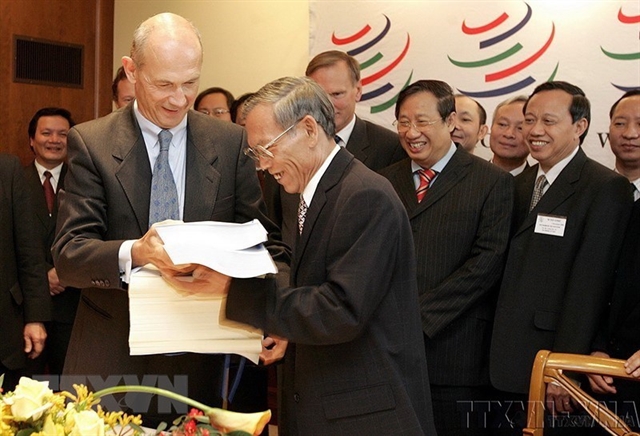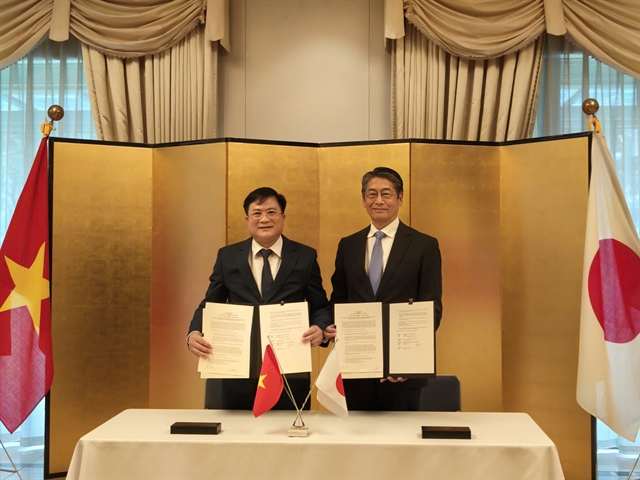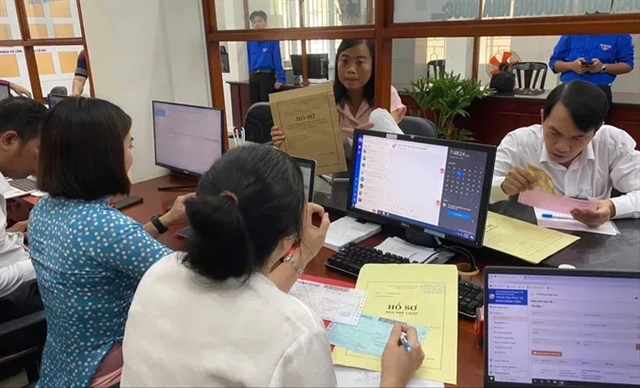 Economy
Economy


|
| On November 7, 2006, the then Minister of Trade Trương Đình Tuyển and General Director of WTO Pascal Lamy signed the protocol on Việt Nam's accession to the WTO. — Photo baochinhphu.vn |
HÀ NỘI — World Trade Organisation (WTO) membership and the signing of 15 free trade agreements (FTAs) has been moving Việt Nam’s economy forward for years, according to experts at the 15th anniversary of Việt Nam’s accession to WTO.
The WTO’s World Trade Statistical Review reported that among the top 50 merchandise traders, Việt Nam has recorded the biggest increase in world ranking, improving its position from 39th place in 2009 to 23th in 2019.
In 2020, the country positioned itself among the 20 leading exporters in international trade.
Economic expert Nguyễn Minh Phong noted the admission to WTO had turned Việt Nam into an economy with high trade openness (200 per cent GDP), with a trade surplus since 2016.
Notably, total trade increased nearly eightfold from US$84.7 billion in 2006 to $668.5 billion in 2021.
Between 2016 and 2020, the trade balance continued pick up steam and reached a peak of over $19 billion. Despite the pandemic, last year’s total exports still hit $336.25 billion, marking a surplus of $4 billion.
According to Ministry of Industry and Trade (MoIT), Việt Nam’s economy has been forging ahead with many upturns in exports thanks to WTO membership.
The country has successfully expanded its trade footprint in almost all markets worldwide and actively participated in global value chains and production networks.
Việt Nam’s exports have become more processing-oriented with processed goods’ contribution to exports rising from 80.3 per cent in 2016 to nearly 89.2 per cent in 2021.
The number of products that commercially fetch more than $1 billion ballooned from nine in 2006 to 35 last year.
Nguyễn Thị Thu Trang, director of WTO and Integration Center under the Việt Nam Chamber of Commerce and Industry, said that the strict compliance to WTO frameworks had allowed Vietnamese firms and the economy to grow steadily in the past 15 years.
Remarkably, firms and the economy had successfully adapted themselves to the ensuing FTAs and turned the new situation to their advantage without experiencing any trade shocks.
In the future, it is all about institutional reforms, competitiveness enhancement and human resource improvement, which will help firms and the economy to continue to move forward, Trang added.
Lương Hoàng Thái, director of Multilateral Trade Policy Department, believes Việt Nam has developed into an investment magnet thanks to the implementation of FTAs.
According to US News&World Report, Việt Nam was ranked 8th among the 20 best countries to invest in 2019, moving from 23th in 2018. The country is an attractive investment location for many of the world's leading corporations including Samsung, Microsoft and LG.
There are about 34,500 projects in Việt Nam funded by foreign investors so far. Total registered investment topped $408 billion. In 2021, the country continued to draw in around $31.15 billion of foreign investment, up 9.2 per cent compared to 2020.
Undoubtedly, WTO membership and FTAs have been giving impetus to Việt Nam’s growth in trade and investment.
Trần Quốc Khánh, MoIT deputy minister, said the the ministry would continue to implement ratified FTAs, diversify exports and export markets, improve export quality, and stick to rules and regulations on product quality and origin to get the most out of WTO membership and FTAs.
Việt Nam was admitted to the WTO on November 7, 2006 and became an official member of the world’s largest trade organisation on January 11, 2007. — VNS




